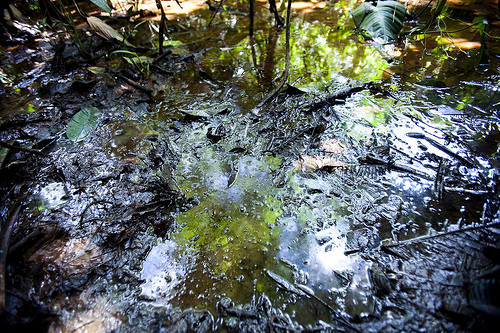 On Monday it was announced in various news sources that the 17-year battle between Chevron and the country of Ecuador over environmental damages in the Amazon would result in the payment of about $9 billion in damages by the oil company. While this falls woefully short of the $113 billion that the Ecuadorians were seeking and may simply be a symbolic ruling as the exchange of money will unlikely come to fruition (even after many more years of appeals), it begs a larger question, why can’t oil companies do anything positive (besides run the world economy)?
On Monday it was announced in various news sources that the 17-year battle between Chevron and the country of Ecuador over environmental damages in the Amazon would result in the payment of about $9 billion in damages by the oil company. While this falls woefully short of the $113 billion that the Ecuadorians were seeking and may simply be a symbolic ruling as the exchange of money will unlikely come to fruition (even after many more years of appeals), it begs a larger question, why can’t oil companies do anything positive (besides run the world economy)?
If you ask anyone to look back on 2010 and tell you what the biggest news story of the year was, you’re more than likely to get, “the BP oil spill” as your response. And for good reason. It was an enormous and egregious environmental disaster (not to mention a PR calamity) in which various companies that most people already think are evil and have too much money were bickering about whom was responsible. In fact, it was kind of like a grade school fight. The media attention was also not surprising because the incident happened on US soil (obviously I’m using that term loosely).
But what the events in Ecuador show us is that perhaps oil companies should actually get more negative coverage. For instance, an oil spill like the Gulf incident has been going on for at least the last 40 years in the Niger Delta in Nigeria. To some extent people are aware of this, but probably not as many as you think (or as many should know about it), particularly since the US imported 982,000 barrels per day from Nigeria in 2010 (fourth behind Canada, Saudi Arabia and Venezuela).
The sad part of it is that while oil is probably the most important aspect of our (the US) consumer culture it is this unbridled thirst that allows oil companies to skirt accountability and transparency considerably easier than companies in other sectors. In many developing countries that have highly under-developed economies it is often natural resources that have the opportunity to lead to the next level of development and for various reasons they fall short (that’s for another article or research paper). It’s hard to make the argument that the responsibility doesn’t squarely sit with the host government, since technically companies in the extractives sector, like any company are responsible to their shareholders, but it would be nice just once to see a headline in the newspaper that shows an oil company taking appropriate safety precautions, respecting the local environs including the rights of indigenous people and accepting responsibility for errors large or small. That really does not seem like too much to ask, or does it?
Image Credit by rainforestactionetwork via Flickr under a CC license




